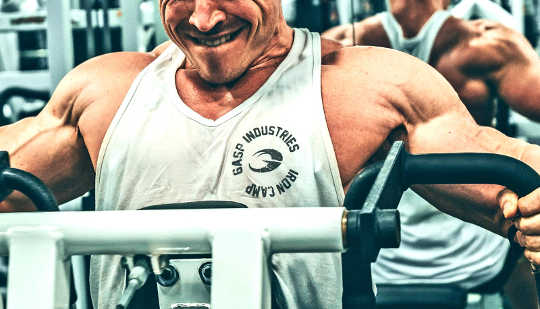
All men who immerse themselves in bodybuilding describe themselves as having some degree of muscle dysmorphia. "A common sentiment among bodybuilders is 'the day you start lifting is the day you become forever small'," says Mair Underwood. (Credit: Ryan Snaadt/Unsplash)
People who lift weights for aesthetic reasons run the risk of developing muscle dysmorphia, also called “reverse anorexia,” according to a new study.
The condition, also known as “bigorexia,” is characterized by obsessive thoughts, compulsive behaviors, and body image distortion. People with the condition see themselves as smaller than they are.
Muscle dysmorphia was first identified in bodybuilders, the people who are also most likely to suffer from it, says Mair Underwood, an anthropologist at the University of Queensland.
“Bodybuilding is a risk environment for mental health, and with so many young people building their bodies to look good, the dangers of developing muscle dysmorphia can’t be ignored.”
The pathological preoccupation with muscularity and “being big” can cause great mental distress and many sufferers attempt suicide.
While some women have been found to suffer from muscle dysmorphia, men are especially at risk.
The study found all men who immerse themselves in bodybuilding practice describe themselves as having some degree of muscle dysmorphia.
“A common sentiment among bodybuilders is ‘the day you start lifting is the day you become forever small’,” Underwood says.
The study found some bodybuilders try to manage the disorder by weighing and measuring themselves, taking photographs, and asking others for feedback.
“Unfortunately, these management strategies are actually all symptoms of muscle dysmorphia, so it is vital people get guidance to develop strategies that will help them, instead of making the disorder worse,” Underwood says.
Researchers conducted the study over the last four years in online communities frequented by bodybuilders who use image and performance enhancing drugs.
“Unfortunately, we don’t know what healthy or normal bodybuilding is and how it differs from psychopathological bodybuilding,” Underwood says. “We don’t know what causes people to become obsessive about their size or even how to help them.
“But by collaborating with bodybuilding communities, we can develop ways to help sufferers manage their disorder and prevent people developing it in the first place.”
The study appears in the journal Health. A University of Queensland Early Career Researcher Grant funded the work.
Source: University of Queensland

Books Improving Attitude and Behavior from Amazon's Best Sellers list
"Atomic Habits: An Easy & Proven Way to Build Good Habits & Break Bad Ones"
by James Clear
In this book, James Clear presents a comprehensive guide to building good habits and breaking bad ones. The book includes practical advice and strategies for creating lasting behavior change, based on the latest research in psychology and neuroscience.
Click for more info or to order
"Unf*ck Your Brain: Using Science to Get Over Anxiety, Depression, Anger, Freak-Outs, and Triggers"
by Faith G. Harper, PhD, LPC-S, ACS, ACN
In this book, Dr. Faith Harper offers a guide to understanding and managing common emotional and behavioral issues, including anxiety, depression, and anger. The book includes information on the science behind these issues, as well as practical advice and exercises for coping and healing.
Click for more info or to order
"The Power of Habit: Why We Do What We Do in Life and Business"
by Charles Duhigg
In this book, Charles Duhigg explores the science of habit formation and how habits impact our lives, both personally and professionally. The book includes stories of individuals and organizations who have successfully changed their habits, as well as practical advice for creating lasting behavior change.
Click for more info or to order
"Tiny Habits: The Small Changes That Change Everything"
by BJ Fogg
In this book, BJ Fogg presents a guide to creating lasting behavior change through small, incremental habits. The book includes practical advice and strategies for identifying and implementing tiny habits that can lead to big changes over time.
Click for more info or to order
"The 5 AM Club: Own Your Morning, Elevate Your Life"
by Robin Sharma
In this book, Robin Sharma presents a guide to maximizing your productivity and potential by starting your day early. The book includes practical advice and strategies for creating a morning routine that supports your goals and values, as well as inspiring stories of individuals who have transformed their lives through early rising.





















